Youth Resource
Does the scientific study of our universe support belief in God?
There are aspects of scientific study that resonate with belief in the God, such as the laws of science and the fine-tuning of the universe.
Videos
-
Things that point us to a god
David Wilkinson tells Simon Smart about the aspects of his scientific study that point him towards belief in God.
Transcript
SIMON SMART: So why do you believe there’s a god?
DAVID WILKINSON: I believe in a god because there are pointers within the universe itself (but not proofs) – things like laws we encounter as scientists or the fact that the universe is just right (in a Goldilocks sense) to make life possible, or the intelligibility of the laws. But ultimately, I believe in God because I’ve encountered God revealing himself supremely in Jesus. That’s been my own experience in life, and it’s fundamental to the Christian belief – that God isn’t a god who’s proved in a mathematical sense, but a god who reveals himself in the life, death and resurrection of Jesus.
SIMON SMART: Are there aspects of your scientific study that push you in the direction of belief in a god?
DAVID WILKINSON: Yes, absolutely. As I encounter as an astrophysicist a number of things about the universe, they point or resonate with my Christian faith. They’re not a logical proof that I can offer to other people – but, for instance, the fact that this universe is so vast (our Milky Way galaxy is 100 billion stars and it’s one of 100 billion galaxies in the universe, so there are more stars than grains of sand on the beaches of the world), and there’s a question there for me about ‘What is the significance of human beings in the vastness of the universe?’ Or as I look at the laws of science I see that they’re very beautiful and elegant, and the question there for me is, ‘Where do they come from?’ Or as I encounter the universe, the sense of awe – what do I do with that? – which is shared by many, many scientists, and for me, it leads to worship. So as a Christian I come to these things and find that they’re entirely coherent, and consistent, with belief that the universe is creation. And for many of my friends who aren’t Christians, they may be pointers towards a deeper story in the universe.
close -
A finely balanced universe
Tom McLeish on how the universe looks like it’s been finely tuned to allow for order and life.
Transcript
SIMON SMART: Is the sense that the universe is just so right for the life we experience suggestive to you of a created place?
TOM MCLEISH: I would say that it’s consistent that it is created. There’s a history of people; interestingly, most of them atheists – Fred Hoyle and Martin Reiss, both of them in the UK, wrote in two different generations in the last century of the extraordinarily fine balance that you need in a world for the world to produce order out of chaos, for it to be an ordered universe. So it looks as though – even Hoyle said it – it looks as though somebody fixed it, it looks as if there’s a mind behind the delicate way that this world is balanced. Physics has shown it could be otherwise but as far as we’re aware if you twiddle the knobs on the numbers that determine the fundamental rules of this universe, with most other sets of numbers you get a mess – you get something which lasts about two seconds or you get something which dissipates into a cloud and nothing more forever and ever and ever. So something like this is going on.
Now, there are other ways people think of explaining that – maybe there are an infinite number of universes. Well, maybe there are. There are ways in which that might occur, but there’s no firm physical reason to understand there are. In which case, we’re obviously in the one that we’re in, the one that works. But that for me is just as difficult a leap of faith as the leap of faith into a Creator God.
close -
Fine Tuning and the Multiverse Theory
William Lane Craig on the weaknesses of the multiverse hypothesis to explain the fine-tuning of the universe.
Transcript
SIMON SMART: In response to the fine tuning of the universe as a possible pointer towards God, we’re sometimes told that a multiverse does away with this need for this appearance of design. We just happen to be in one of billions of universes in which the properties required for life to exist as we know it are in place. This multiverse gets a bit of a run – what’s your response to it?
WILLIAM LANE CRAIG: I would say that even if a multiverse exists, it does not explain the fine-tuning. This point has been made very forcefully by Roger Penrose of Oxford University. What Penrose points out is that it is incomprehensibly more probable that our solar system would just instantaneously form through the random collision of particles than that a finely tuned universe would exist. What that means is that there are far more universes in this multiverse in which observers form just by the random collision of particles than finely-tuned worlds. If we were just a random member of a multiverse, we ought to be observing an island of order no bigger than our solar system because that’s incomprehensibly more probable than a finely-tuned universe. In fact, the most probable observable universe would be a universe in which a single brain fluctuates into existence out of the quantum vacuum and observes its otherwise empty world. So if we were just a random member of a multiverse, we ought to be having observations like that, and since we don’t, that strongly disconfirms the multiverse hypothesis.
close -
Finding order in the universe
Andy Crouch shares one of the reasons why he thinks human beings are more than just complex physical machines.
Transcript
ANDY CROUCH: We have an innate desire to find order in the world – a kind of ordered beauty in the world – and when we come upon it, we exult in it, we appreciate it, we seek it. And I don’t know how you explain that, but what is really hard to explain is that we actually find it. That as we examine the cosmos – and I’m thinking especially about the most fundamental discoveries about the nature of the cosmos – we find more and more evidence of what you might call ordered abundance in the structure of the world. And there’s no clear reason that the world would have to be that way – the world could basically be just chaos, there are civilisations that actually pretty much believed that is what the world was. And even if the world did have this ordered abundance, why do human beings have this built-in desire to find it, to actually investigate and find it? And yet there’s this incredible mathematical elegance to the world at the largest scales and in some ways the smallest scales, that we are built to seek out. Now where did that come from?
close -
The beauty of the universe
Jennifer Wiseman reflects on whether the beauty of the cosmos might say something about the existence of God.
Transcript
NATASHA MOORE: For you, does the beauty of the universe say something about God?
JENNIFER WISEMAN: I think, for me, it does. Now, I don’t think by looking with a telescope or a microscope that you can prove God or something like that – these are different kinds of questions. So we use our scientific tools to answer the kinds of questions that scientific tools are designed to answer. So I can use my telescope to measure distances to galaxies, or even to discern the evolution of the universe, which is an amazing thing that we’re doing with our telescopes.
But, for me, I am a person of faith, and when I look at the universe as a whole, it gives me a sense of God’s providence, and, kind of, majesty overseeing a universe that’s above and beyond what we can imagine with our human minds. And provision – you can kind of see how the universe, through natural laws, has evolved to the point of having stars with planets, and planets that can support life – but that whole cosmic history that we understand scientifically also feeds into my faith understanding of God’s provision for life and his love of life.
So I also get a sense, I think, that God is big, and looking over things that I’m not even aware of. And that makes me ever more appreciative.
close
Articles
-
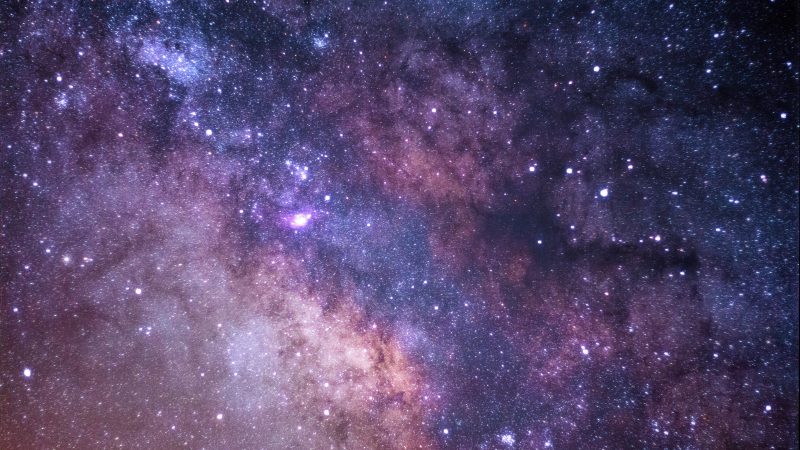
What is the nature of the universe?
Simon Smart discusses some of the ‘hints’ of God’s existence that we find in the scientific study of the universe.
-
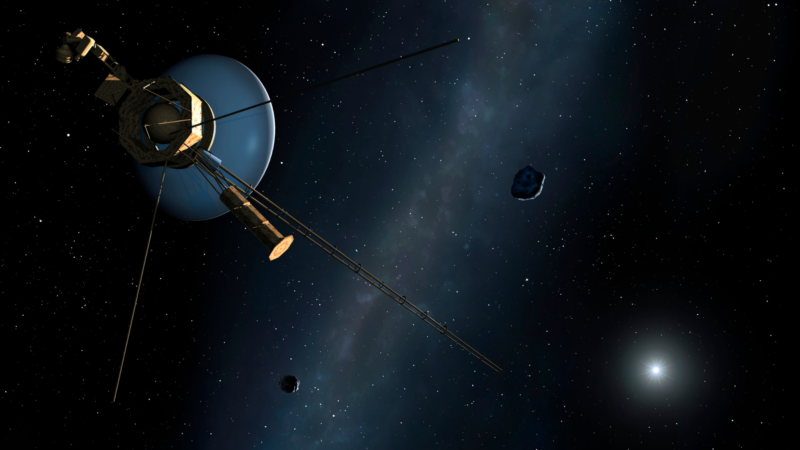
Glorious inefficiency
In a week full of space news, Emma Wilkins responds to the argument that the vastness of the universe is proof that there is no God.
-
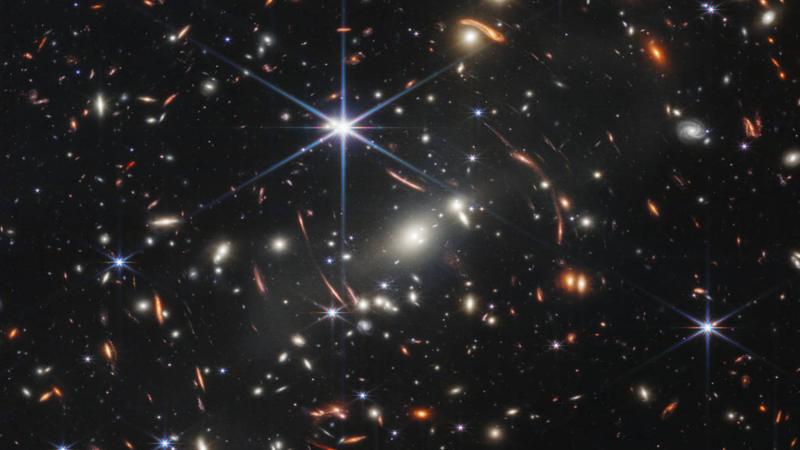
God’s backyard
Justine Toh ponders the breathtaking, glorious new images of distant galaxies from NASA’s James Webb telescope.
-

The ‘terrifyingly small’ reason why so many astronauts find God
For the fiftieth anniversary of the first moon landing, Simon Smart writes on humanity’s hunger for transcendence.
Engage
- Look at the following images captured by NASA’s James Webb telescope and complete the See, Think, Wonder Thinking Routine.
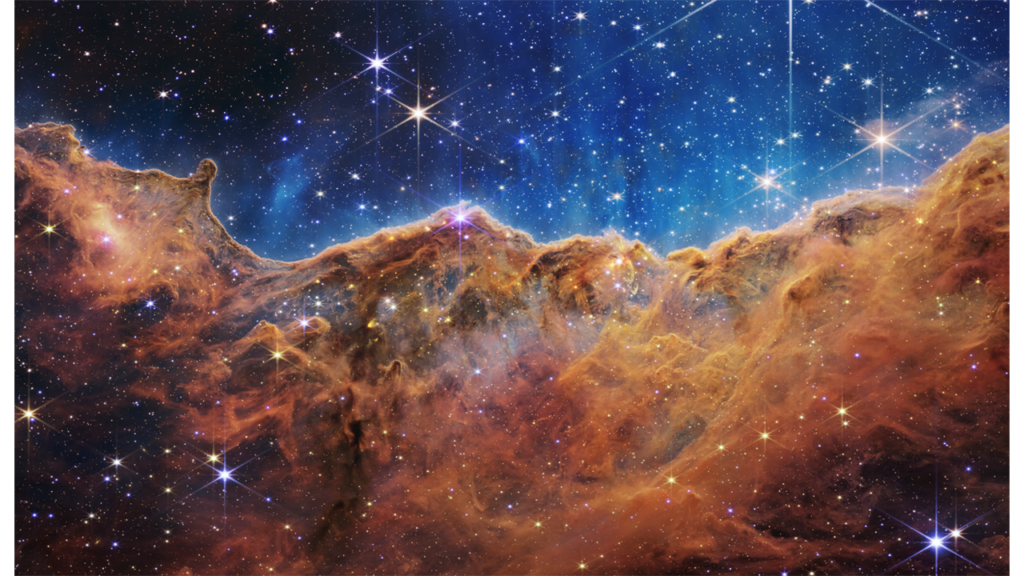

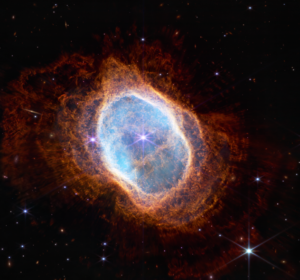
- Read the Buzzfeed article 53 Facts About Space That Will Either Fascinate You Or Keep You Pondering All Night.
- Pick one fact that stands out to you, and in small groups, share why you chose this fact.
- Discuss: What picture do you get of the universe and its complexity from all these facts?
- Brainstorm reasons that people might believe that the universe points to a Creator, and reasons people might believe that it points to the opposite (i.e., that it was created by chance).
- Reflect: What is your view on the question of whether the universe points to a God?
Understand & Evaluate
- Watch the videos Things that point us to a God; A finely balanced universe; and Finding order in the universe, and read the article What is the nature of the universe?
- Complete the Compass Points Thinking Routine based on the propositions you have heard and read.
- What is your reaction to these quotes from scientists mentioned by Tom McLeish and Simon Smart?



- Watch either the video Fine tuning and the multiverse theory or read the short column Glorious inefficiency. Answer the following questions based on the piece you chose:
- What argument is this video or column responding to?
- What are the strengths and weaknesses of these arguments (both the ones that the CPX content presents, and the ones they are responding to)?
- Watch or read one of The beauty of the universe; God’s backyard; and The ‘terrifyingly small’ reason why so many astronauts find God.
- Is there anything that surprised you from what you heard or read?
- What is one question you have after watching or reading this content?
- Write an email to either Jennifer Wiseman, Matthew McConaughey, or Buzz Aldrin, reflecting on and asking them more about their perspectives on the universe and God.
Bible Focus
- Read Genesis 1:1, Psalm 19:1-4, and Romans 1:20.
- Write an engaging newspaper headline that encapsulates the main point of these Bible verses.
- Thinking about the points made in the CPX videos and articles, in what ways might Christians believe that “the heavens declare the glory of God”?
Apply
- Hold a class debate on the topic: Scientific study reveals a universe that is consistent with belief in a Creator God.
- Revisit your answer to Engage Question 4. Has your answer changed? Why or why not?
- If it is true that “the heavens declare the glory of God”, what implications might this have for life today?
Extend
- In pairs, conduct some further research on the fine-tuning argument, and create an engaging PowerPoint or Prezi presentation summarising the argument, its possible explanations, and its potential implications.


